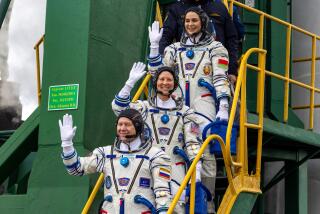Spaceman Back After 326 Days, Feeling ‘Great’
MOSCOW — A Soviet cosmonaut ended a record 326-day stay in space today, a feat that could help determine how astronauts will fare on a mission to Mars in the next century that will be almost three times longer.
A Soyuz TM-3 space capsule carrying Yuri Romanenko and two colleagues parachuted down on target in the snowy steppes of Soviet Kazakhstan.
The landing was reported live on Soviet television from the cosmodrome at Baikonur. The mission control staffers clasped their hands in victory as the capsule returned.
“We have touchdown,” the brief announcement from the control room said, interrupting the television commentary.
Romanenko slithered out of the capsule shortly after the landing and announced:
“I feel great. I’m satisfied with the work I did and glad to see you on the earth of Kazakhstan.”
Romanenko was helped over to a waiting helicopter, where doctors made a preliminary judgment that his health was good and gave him a cup of tea.
Tops Record by 3 Months
For Romanenko, 43, it marked the end of nearly 11 months in space--surpassing by nearly three months the previous record of 237 days set in 1984 by three other Soviet cosmonauts.
Radio Moscow said the cosmonauts underwent medical examinations at the landing site. It said nothing about what the medical tests showed, but reported that doctors are paying “close attention” to Romanenko’s condition.
A later Tass press agency dispatch reported that Romanenko and his colleagues, Alexander Alexandrov and Anatoly Levchenko, are “feeling fine after the landing.”
It said Alexandrov, 44, had completed 160 days in space. He joined Romanenko aboard the orbiting space station Mir in July, when his original crew mate, Alexander Laveikin, was brought back to Earth after irregularities in his heartbeat developed.
Mars Mission Planned
Levchenko, 46, blasted off to Mir on Dec. 21 with the space station’s replacement crew, Vladimir Titov, 40, and Musa Manarov, 36.
Soviet radio said today that the new crew will spend a year in space, carrying out experiments and again testing man’s ability to adapt to long periods of weightlessness.
Space experts say that apart from being feats of endurance, the long missions have the practical purpose of finding out how cosmonauts will cope with a 30-month mission to Mars planned for early in the next century.
More to Read
Sign up for Essential California
The most important California stories and recommendations in your inbox every morning.
You may occasionally receive promotional content from the Los Angeles Times.










